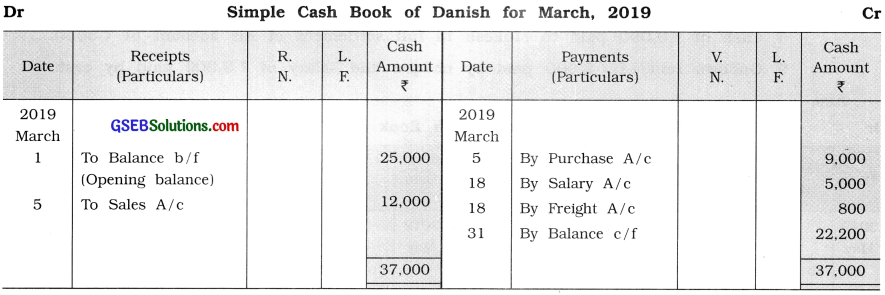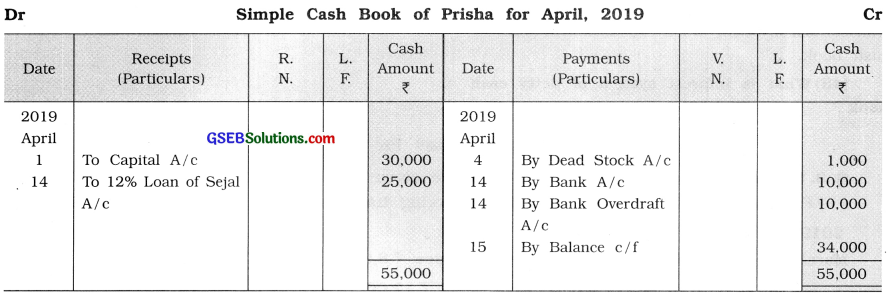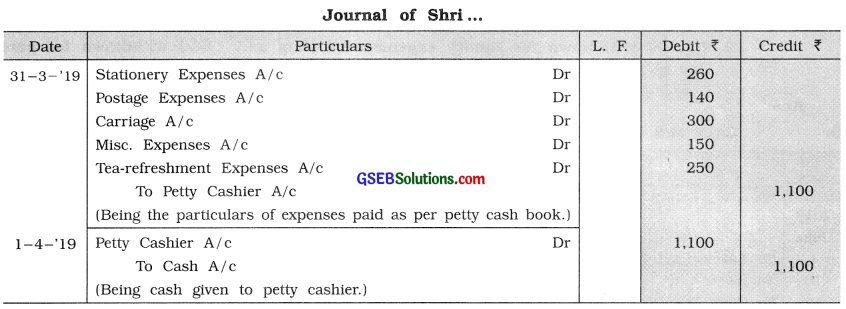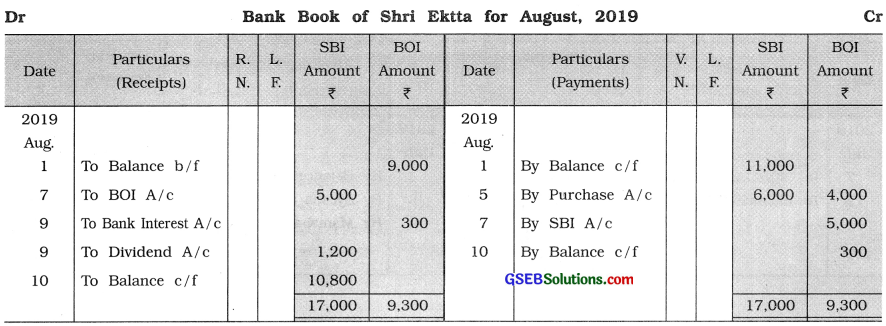Gujarat Board GSEB Class 11 Commerce Accounts Important Questions Part 1 Chapter 7 Cash Book and Its Types Important Questions and Answers.
GSEB Class 11 Accounts Important Questions Part 1 Chapter 7 Cash Book and Its Types
Very Short Questions (VSQs)
Answer the following questions in one sentence : [1 mark each]
Question 1.
What is Cash book?
Answer:
A subsidiary book which is used by businessman to record cash transactions as well as transactions with the bank is known as Cash book.
Question 2.
What is known as Credit side of cash book ?
Answer:
Credit side of cash book is known as Payment side.
![]()
Question 3.
Explain any two utilities of the cash book.
Answer:
Two utilities of the cash book are as under :
- It is not necessary to open a separate Cash account in the ledger.
- The benefit of division of labour can be obtained.
Question 4.
In cash book, which two accounts are not required to be posted in the ledger?
Answer:
In cash book, Cash account and Bank account are not required to be posted in the ledger.
Question 5.
How is the structure / format of cash book ?
Answer:
The structure / format of cash book is like a ledger account.
Question 6.
State the types of two columnar cash book.
Answer:
There are three types of two columnar cash book :
- Cash and discount columnar cash book,
- Cash and bank columnar cash book and
- Bank and discount columnar cash book.
Question 7.
Explain the meaning of bank balance.
Answer:
In bank column of cash book, if the total of receipt column is more than the total of payment column, the difference is called bank balance.
Question 8.
What is called Bank overdraft ?
Answer:
In bank column of cash book, if the total of payment column is more than the total of receipt column, the difference is called Bank overdraft.
![]()
Question 9.
In which side of cash book opening bank overdraft is recorded ?
Answer:
Opening bank overdraft is recorded / shown on the credit side of cash book in the bank column as ‘balance brought forward’.
Question 10.
What is ‘Contra transaction’?
Answer:
‘Contra transaction’ means such financial transaction, in which cash and bank, both the accounts get affected. This type of transaction is recorded on both the side of cash book.
Question 11.
How many parties are there in the cheque? Which are they?
Answer:
There are three parties in the cheque :
- Drawer of the cheque (Account holder),
- Drawee of the cheque (Bank) and
- Receiver of money.
Question 12.
What is Bank book?
Answer:
An account book in which businessman records only banking transactions entered with different banks is called Bank book.
Question 13.
When Bank book is maintained by the trader?
Answer:
When the trader keeps more than one account in a bank or keeps accounts in more than one bank, Bank book is maintained to record the bank transactions easily.
Question 14.
State any two advantages of Bank book.
Answer:
With the help of Bank book,
- Transactions can be easily reconciled with pass s book or bank statement.
- Information regarding bank balance or bank overdraft can be known.
![]()
Question 15.
What is called Petty cash book?
Answer:
The book kept for keeping a record for the payment of a small expenses is known as Petty cash book.
Question 16.
How many types of petty cash book are there ? Which are they ?
Answer:
Petty cash book can be prepared in two ways :
- Simple petty cash book and
- Petty cash book on imprest system.
Question 17.
What is known as Debit side of cash book ?
Answer:
Debit side of cash book is known as Income or Receipt side.
Question 18.
Which type of cash book is?
Answer:
Cash book is a type of subsidiary book in which only cash transactions are recorded.
Question 19.
Who serves the purpose of journal entry and cash account both ?
Answer:
Cash book serves the purpose of journal entry and cash account both.
Question 20.
How is known as the left side of the cash book?
Answer:
The left side of the cash book is known as Debit side or Receipt side.
![]()
Question 21.
How is known as the right side of the cash book?
Answer:
The right side of the cash book is known as Credit side or Payment side.
Question 22.
Explain the types of cash book.
Answer:
There are three types of cash book:
- Simple cash book,
- Two columnar cash book s and
- Three columnar cash book.
Question 23.
In simple cash book which type of transactions are recorded?
Answer:
Only all types cash receipts and payments transactions are recorded in the simple cash book.
Question 24.
Which types of transactions are not recprded in the simple cash book?
Answer:
Non-cash and credit transactions are not recorded in the simple cash book.
Question 25.
Why cash account has always debit balance ?
Answer:
Cash payment is never more than cash receipts, therefore balance of cash account is always debit balance.
Question 26.
Which type of cash book is not very popular? Why?
Answer:
Bank and discount columnar cash book is not very popular, because cash transactions do take place to some extent in any business along with the bank transactions.
![]()
Question 27.
What is called Endorsement ?
Answer:
When the cheque is received from the customers or debtors, the name of creditors or traders written on the backside of the cheque and the payment is made directly, then it is called Endorsement.
Question 28.
Where endorsement transaction is recorded ?
Answer:
Endorsement transaction is recorded in journal proper.
Question 29.
How many types of cheques are there ? Which are they?
Answer:
There are two types of cheques :
- Bearer / Simple cheque and
- Crossed cheque.
Question 30.
Which books are given by the bank to trader / businessman for smooth banking transactions ?
Answer:
- Pay-in slip book,
- Cheque book and
- Pass book are given by the bank to trader / businessman for smooth banking transactions.
Question 31.
Mention the types of contra transactions.
Answer:
Generally, contra transactions are of two types :
- Cash deposited in the bank and
- Cash withdrawn from the bank.
![]()
Question 32.
How is contra transaction is expressed in the cash book?
Answer:
In order to know the contra transaction, word ‘C’ is written in the L.F. No. column of cash book on both the sides.
Question 33.
Why ‘C’ is written in the L.E No. column for contra transaction ?
Answer:
When contra transaction is recorded in the cash book, word ‘C’ (Contra) is written in the L.E No. column of cash book on the both the side, which indicates that positing of this transaction is not to be done.
Question 34.
What are the uses of pay-in slip book and cheque book?
Answer:
Pay-in slip is used to deposit cash or cheque received in the bank while cheque is used to withdraw cash from the bank or to make payment by cheque.
Question 35.
What is pass book ?
Answer:
Pass book is an abstract of the trader’s ledger account in the books of the bank.
Question 36.
How is recorded the amount of cash discount in the three columnar cash book?
Answer:
Discount allowed is recorded on debit side and discount received is recorded on credit side of the cash book.
Question 37.
Write the full form of NEFT.
Answer:
National Electronic Fund Transfer is the full form of NEFT.
![]()
Question 38.
Write the full form of RTGS.
Answer:
Real Time Gross Settlement is the full form of RTGS.
Question 39.
What is Debit card ?
Answer:
A card is issued by the bank to an individual / a firm to withdraw the amount or to make payment from the available balance is called Debit card.
Question 40.
What is Credit card ?
Answer:
A credit card is a plastic card issued by the banks to an individual/a firm to withdraw the ? amount or to make payment upto certain limit.
Question 41.
Who pays charges for the NEFT services ?
Answer:
Fund sender has to pay charges for the NEFT services to the bank.
Question 42.
Who pays RTGS charge to the bank ?
Answer:
The fund sender pays RTGS charge to the bank.
Question 43.
What is the maximum time limit for fund transfer through RTGS ?
Answer:
Through RTGS, fund is transferred immediately or in maximum 30 minutes from s sender’s account to the receiver’s account.
![]()
Question 44.
Which service is used for large fund transfer by the trader?
Answer:
RTGS service is used for large fund transfer by the trader.
Question 45.
Who can get the benefit of NEFT service ?
Answer:
Individuals, firms and corporate units can get the benefit of NEFT service.
Question 46.
How is the structure of the Bank book ?
Answer:
The structure of the Bank book is exactly like the cash book.
Question 47.
Why is a petty cash book maintained ?
Answer:
A petty cash book is maintanied to have effective control over cash balance and cash payments and to record systematically repetitive transactions involving small expenses in a separate cash book.
Question 48.
What is Imprest system of petty cash book ?
Answer:
Imprest system is a system of petty cash book, in which fixed amount of cash balance is maintained at the beginning of each period.
Question 49.
Under which act, cheque is a negotiable instrument ?
Answer:
Cheque is a negotiable instrument under the provision of Negotiable Instrument Act 1881 in India.
![]()
Question 50.
What is limit of the amount for fund transfer under NEFT service ?
Answer:
There is no minimum or maximum limit of the amount for fund transfer under NEFT service.
Short Sums for Cash Book
Prepare a necessary Cash book from the given transations: [3 or 4 marks each]
Question 1.
Prepare simple cash book from the following transaction of Danish for March, 2019:
2019
March 1 Cash balance ₹ 25,000; bank balance ₹ 8,000.
5 Cash purchase ₹ 9,000; cash sales ₹ 12,000.
18 Salary ₹ 5,000 & Freight ₹ 800 paid.
30 Kamal has paid ₹ 2,000 by cross cheque towards his debt.
Answer:

Question 2.
Record the following transactions in the simple cash book of Prisha:
2019
April 1 Started the business by bringing in cash ₹ 30,000 and hank overdraft ₹ 10,000.
4 Purchased balances and weights of ₹ 1,000 for the shop.
7 Fire insurance premium of ₹ 2,000 is paid by personal cheque.
14 As more funds are required, a loan of ₹ 25,000 is taken from Sejal at 12%. From this amount opened a bank account by depositing ₹ 10,000 and paid bank overdraft.
Answer:

![]()
Question 3.
From the following transactions, prepare cash and discount columnar cash book of Vikas :
2019
May 1 Opening cash balance ₹ 12,000.
3 Goods of ₹ 8,000 sold at 10 % trade discount and 10 % cash discount.
5 Cash of ₹ 3,000 paid to Mukesh in full settlement of his account of ₹ 3050.
9 Godown rent of ₹ 2,000 paid by cheque and salary of ₹ 3,000 paid by cash.
Answer:

Question 4.
From the following transactions, prepare cash and bank columnar cash book in the books of Radha Traders :
2019
June 1 Opening cash balance ₹ 10,000; opening bank overdraft ₹ 4,000.
10 Goods of ₹ 8,000 sold to Haresh at 10 % trade discount. Haresh has paid half
of the amount by cash and remaining amount is paid by cross cheque.
12 ₹ 1,000 withdrawn for sundry expenses for shop and ₹ 600 withdrawn for personal
use from the bank.
Answer:

![]()
Question 5.
From the following transactions, prepare bank and discount columnar cash book in the
books of Navin Stores:
2019
July 1 Bank overdraft ₹ 15,000.
7 Goods of ₹ 20,000 sold to Manisha at 10% trade discount and 10% cash discount.
Manisha gave a cross cheque after deducting discount.
10 Cheque of ₹ 6,000 issued to Ayesha in full settlement of account of ₹ 6,060.
11 Cheque issued by Manisha is dishonoured.
Answer:

Question 6.
The following information has been obtained in respect of the petty cash book maintained as per petty cash book on imprest system for the month ending on dt. 31 -3 -’19:
Stationery expenses ₹ 260; Postage expenses ₹ 140; Carriage ₹ 300; Misc. expenses ₹ 150 and
Tea-refreshment expenses ₹ 250.
.From this information pass journal entries as chief cashier.
Answer:

![]()
Question 7.
From the following transactions, prepare State Bank of India (SBI) and Bank of India (BOI) columnar bank book in the books of Ektta:
2019
Aug. 1 Opening bank overdraft (SBI) ₹ 11,000 and bank balance (BOI) ₹ 9,000.
5 Goods of ₹ 10,000 purchased, against that a cheque of ₹ 4,000 of BIO is issued and SBI cheque of ₹ 6,000 is issued.
7 Cheque of ₹ 5,000 issued from bank account of BOI, is deposited in the bank account of SBI.
9 BOI credited ₹ 300 for bank interest and dividend of ₹ 1,200 collected by SBI and credited in the account.
Answer:

Multiple Choice Questions (MCQs)
Write the correct option from those givdn below each question : [1 mark each]
Question 1.
How many types of two columnar cash book can be prepared?
(a) Two
(b) Three
(c) Four
(d) Five
Answer:
(b) Three
Question 2.
What is written in the particular column of payment / credit side of cash book, when cash ₹ 9,000 withdrawn from bank for office expenses ?
(a) By Office Expense A/c
(b) By Cash A/c
(c) By Sundry Expense A/c
(d) By Bank A/c
Answer:
(b) By Cash A/c
Question 3.
Which balance of bank overdraft in the books of bank has?
(a) Debit balance
(b) Credit balance
(c) Any balance
(d) No balance
Answer:
(a) Debit balance
Question 4.
What effect is made on bank balance, if the amount of share dividend is collected and recorded by the bank?
(a) Balance decreases
(b) Balance increases
(c) Balance compensates
(d) No effect on balance
Answer:
(b) Balance increases
Question 5.
What effect is made on balance of bank overdraft, if bank has recorded / debited the amount of bank charges in the account of trader ?
(a) B.O.D. balance decreases
(b) B.O.D. balance increases
(c) B.O.D. balance compensates
(d) No effect on B.O.D. balance
Answer:
(b) B.O.D. balance increases
![]()
Question 6.
Purchased goods of ₹ 10,000. In which subsidiary book this transaction is recorded ?
(a) Purchase book
(b) Sales book
(c) Journal proper
(d) Cash book
Answer:
(d) Cash book
Question 7.
Purchased furniture of ₹ 12,000. In which subsidiary book this transaction is recorded ?
(a) Purchase book
(b) Sales book
(c) Journal proper
(d) Cash book
Answer:
(d) Cash book
Question 8.
Why petty cash book is maintained ?
(a) Recording bank transactions
(b) Recording sundry expenses
(c) Recording sundry incomes
(d) Recording non-cash transactions
Answer:
(b) Recording sundry expenses
Question 9.
Which accounts are not maintained in the ledger when three columnar cash book is prepared by trader ?
(a) Given and Received Discount accounts
(b) Traders and Customers accounts
(c) Cash and Bank accounts
(d) Bank and Discount accounts
Answer:
(c) Cash and Bank accounts
Question 10.
Where interest on bank deposit, which is recorded in pass book, is recorded ?
(a) In cash book
(b) In petty cash book
(c) In credit book
(d) In journal proper
Answer:
(a) In cash book
Question 11.
Which one of the following transaction is not required to be posted in the ledger ?
(a) Contra transaction
(b) Credit transaction
(c) Non-economic transaction
(d) Exchange transaction
Answer:
(a) Contra transaction
![]()
Question 12.
In which side of cash book, transaction of cash deposited into bank, is recorded ?
(a) Debit side
(b) Credit side
(c) Both side
(d) None of these
Answer:
(c) Both side
Question 13.
How many parties are there in a cheque ?
(a) One
(b) Two
(c) Three
(d) Four
Answer:
(c) Three
Question 14.
How many types of cash book are there?
(a) One
(b) Two
(c) Three
(d) Four
Answer:
(c) Three
Question 15.
How is like to the format of cash book?
(a) Tanchan
(b) Journal
(c) Account
(d) None of these
Answer:
(c) Account
Question 16.
Cash book is like to which one of the following account ?
(a) Sales
(b) Cash
(c) Debtor
(d) Purchase
Answer:
(b) Cash
Question 17.
Which types of columns are prepared in petty cash book ?
(a) Cash – Bank
(b) Discount – Bank
(c) Discount – Cash
(d) Income – Expense
Answer:
(d) Income – Expense
![]()
Question 18.
In which side of cash book cash purchase is recorded ?
(a) Debit side
(b) Credit side
(c) Both sides
(d) None of these
Answer:
(b) Credit side
Question 19.
Cash received for previously bad debts written off. In which subsidiary book this transaction is recorded?
(a) Journal proper
(b) Credit book
(c) Debit book
(d) Cash book
Answer:
(d) Cash book
Question 20.
Which account is not opened in ledger by the trader when he keeps simple cash book?
(a) Cash account
(b) Bank account
(c) Bad debts account
(d) Capital account
Answer:
(a) Cash account
Question 21.
Which type of discount is recorded in the cash book?
(a) Unpaid discount
(b) Outstanding discount
(c) Trade discount
(d) Cash discount
Answer:
(d) Cash discount
Question 22.
From the following which book is only a part of cash book?
(a) Bank book
(b) Debit book
(c) Petty cash book
(d) Credit book
Answer:
(c) Petty cash book
Question 23.
How many types of contra transactions are there ?
(a) Five
(b) Four
(c) Three
(d) Two
Answer:
(d) Two
Question 24.
Any transaction recorded on both sides of cash book is known as ………………. .
(a) Exchange transaction
(b) Non-economic transaction
(c) Contra transaction
(d) Transfer transaction
Answer:
(c) Contra transaction
![]()
Question 25.
Out of the following, what are recorded in the cash book?
(a) Credit purchases and sales
(b) Cash receipts and payments
(c) Cash incomes and expenses
(d) Cash gains and losses
Answer:
(b) Cash receipts and payments
Question 26.
In cash of three columnar cash book, balance of the which account is not to be found out?
(a) Cash
(b) Bank
(c) Discount
(d) Trade discount
Answer:
(c) Discount
Question 27.
Credit balance of bank account means …………………. .
(a) Bank balance
(b) Bank loan
(c) Bank overdraft
(d) Bank charges
Answer:
(c) Bank overdraft
Question 28.
Only which type of transactions are recorded in the simple cash book?
(a) Only cash transactions
(b) Only non-cash transactions
(c) Only bank transactions
(d) Only contra transactions
Answer:
(a) Only cash transactions
Question 29.
Which type of account is cash account ?
(a) Personal account
(b) Real account
(c) Nominal account
(d) Common account
Answer:
(b) Real account
Question 30.
Balance of which column is not worked out in cash book ?
(a) Cash
(b) Bank
(c) Discount
(d) None of these
Answer:
(c) Discount
![]()
Question 31.
Which type of account is bank account?
(a) Personal account
(b) Real account
(c) Nominal account
(d) General account
Answer:
(a) Personal account
Question 32.
For the view point of cash book, for which type of transaction L.F. No. is not required?
(a) Cash transaction
(b) Non-cash transaction
(c) Credit transaction
(d) Contra transaction
Answer:
(d) Contra transaction
Question 33.
Which one of the following is an abstract of the trader’s ledger account in the books of the bank ?
(a) Bank book
(b) Cash book
(c) Pass book
(d) Cheque book
Answer:
(c) Pass book
Question 34.
How many types of cheques are there ?
(a) Two
(b) Three
(c) Four
(d) Five
Answer:
(a) Two
Question 35.
Which type of cash book is not very popular ?
(a) Simple cash book
(b) Petty cash book
(c) Three columnar cash book
(d) Bank and discount columnar cash book
Answer:
(d) Bank and discount columnar cash book
Question 36.
As per the present norms, what is the minimum amount to be remitted through RTGS ?
(a) ₹ 1,00,000
(b) ₹ 2,00,000
(c) ₹ 3,00,000
(d) ₹ 20,000
Answer:
(b) ₹ 2,00,000
![]()
Question 37.
How many limit is for fund transfer through NEFT?
(a) Up to ₹ 1,00,000
(b) Up to ₹ 2,00,000
(c) Any amount above than ₹ 3,00,000
(d) No limit
Answer:
(d) No limit
Question 38.
As per the present rule, NEFT services are available from Monday to Friday during ……………….. .
(a) 8.00 pm to 7.00 am
(b) 8.00 am to 7.00 pm
(c) 10.00 am to 6.00 pm
(d) 7.00 am to 8.00 pm
Answer:
(b) 8.00 am to 7.00 pm
Question 39.
Who has to pay charges of NEFT or RTGS to the bank ?
(a) Fund sender
(b) Fund receiver
(c) Customer
(d) Businessman
Answer:
(a) Fund sender
Question 40.
How many types of prompt fund transfer services are provided by the banks ?
(a) Five
(b) Four
(c) Two
(d) Three
Answer:
(c) Two
Question 41.
How much maximum time is required for fund transfer from sender’s account to the receiver’s account through RTGS ?
(a) 90 minutes
(b) 60 minutes
(c) 30 minutes
(d) 15 minutes
Answer:
(c) 30 minutes
Question 42.
Which book is maintained by the trader to record the various bank transactions easily?
(a) Cash book
(b) Bank book
(c) Petty cash book
(d) Pass book
Answer:
(b) Bank book
![]()
Question 43.
The form and structure of the bank book is exactly like the ……………….. .
(a) Debit book
(b) Credit book
(c) Journal book
(d) Cash book
Answer:
(d) Cash book
Question 44.
Which bank has determined maximum charges for NEFT service ?
(a) Ratnakar bank
(b) RBL bank
(c) Reserve Bank of India
(d) Reserve Bank of Bharat
Answer:
(c) Reserve Bank of India
Question 45.
Who prepares the petty cash book?
(a) Chief cashier
(b) Petty cashier
(c) Head cashier
(d) Senior cashier
Answer:
(b) Petty cashier
Question 46.
Which types of columns are opened in petty cash book ?
(a) Cash – Bank
(b) Bank – Discount
(c) Receipt-Various expenses
(d) Payments – Income
Answer:
(c) Receipt-Various expenses
Question 47.
Which type of petty cash book is useful to control petty or small expenses ?
(a) Simple petty cash book
(b) Special petty cash book
(c) Imprest petty cash book
(d) Sundry petty cash book
Answer:
(c) Imprest petty cash book
Question 48.
In which column of cash book word ‘C’ will be written for contra transaction ?
(a) Date
(b) Receipt No.
(c) Voucher No.
(d) L.E No.
Answer:
(d) L.E No.
![]()
Question 49.
Petty cash book is maintained for which types of expenses ?
(a) Big expenses
(b) Small expenses
(c) Revenue expenses
(d) Capital expenses
Answer:
(b) Small expenses
Question 50.
When simple or crossed cheque is issued, which balance increases ?
(a) Cash balance
(b) Bank balance
(c) Bank overdraft balance
(d) Debtor balance
Answer:
(c) Bank overdraft balance